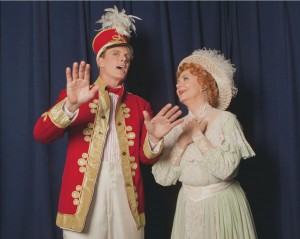Filichia Features: The Music Man In Concert in Mason City, Iowa
Filichia Features: The Music Man In Concert in Mason City, Iowa
Too bad there isn’t a meter to measure civic pride.
If there were, Mason City, Iowa – the real River City that bookwriter-composer-lyricist Meredith Willson fictionalized in his Tony-winning 1957-58 musical The Music Man – would score high.
Now the town with 28,000 people has bought more than 2,000 tickets to two nights of Shirley Jones, Patrick Cassidy and The Music Man In Concert. This would vault Mason City into an uncontested first place on the civic-pride meter as its residents give a tacit challenge to the people of Prior Lake (MN); Paducah; Topeka; Springfield (MO); Oklahoma City and Little Rock, where the concert will soon play. Hey, other towns -- can you possibly show it the love that we will?
The evening begins with band members walking onto a white-latticed platform. Fittingly, the first one out is a trombonist. True, he’s the only one in a band of 12 and thus only represents 1/76th of what Willson ideally imagined. But he’s enough for the crowd to already be applauding.
So that local deejay sent out to warm up theatergoers is superfluous. Yet the crowd applauds again when he says “We’re welcoming Shirley Jones back to River City” -- and yes, he does say “River City.” He also takes advantage of the show’s most famous Willson-ism when citing “We’ll have trouble with a capital ‘T’ and that rhymes with ‘P’ and that stands for ‘Phones.’ Shut them off!”
Then orchestra plays a quick overture (“76 Trombones,” “Till There Was You,” “The Wells Fargo Wagon” and the quodlibet of “Lida Rose” and “Will I Ever Tell You?”). The crowd applauds, but pushes it up 76 trombones worth of decibels as Jones, in a blue pants suit with sequined jacket – and with unashamed gray hair -- saunters on. The next big hand comes when she introduces Cassidy, and not merely because she and then-husband Jack Cassidy created him; he’ll be playing Harold Hill.
Jones asks if many had been in attendance when she was here on June 19, 1962 with co-star Robert Preston to launch the world premiere of The Music Man film. More than a hundred shoot up their hands with the speed of baseball fans who think they have a chance to catch a home run. They really want to convince her that they aren’t Jonesy-Come-Latelys but fondly remember the day that Harold Hill and Marian the Librarian came to town.
Although the title is The Music Man In Concert, it really should be Shirley Jones Remembers The Music Man. The show has been shortened to accommodate the star’s memories. At one point Cassidy even brings on the Oscar that Jones had won for Elmer Gantry. (All right, it’s not the actual Academy Award, Cassidy would later tell me, to which Jones added, “I’d kill him if he tried to take that out of the house.”)
Because Jones’ Oscar came from portraying a woman on whom the Pickalittle Ladies would have really picked, she jokingly drones “Thanks for telling the audience I played a hooker.” She admits the role wasn’t logical preparation for Marian the Librarian. Then she divulges that Onna White, the film’s choreographer, wasn’t ruffled when Jones revealed her lack of dancing ability. White insisted “By the time I’m through with you, you’ll be doing Swan Lake.” She laments that “I never hear from Ronny Howard” but brightens when relating that Warners wanted Frank Sinatra as Harold Hill, but Willson insisted that he wouldn’t green-light the film without Preston. The audience roundly applauds with appreciation and relief.
In addition to dispensing memories, Jones plays Mrs. Paroo, Marian’s mother. Despite the cuts, every dollop of her dialogue stays. While the star’s Irish brogue is so good that she could be surnamed O’Jones or McJones, she isn’t giving an imitation of original Mrs. Paroo Pert Kelton. Jones also gets one line in “The Wells Fargo Wagon,” but “And I expect a new rocking chair” is inappropriate. This lady, although 80, is still far from needing one.
When 2104’s Marian – Teri Bibb – sings “Goodnight, My Someone,” “My White Knight” and “Till There Was You,” director Glenn Casale puts Jones in a nearby spotlight. There we can see her justifiable admiration for the new Marian and a face full of memories.
Is Jones also thinking of original Marian Barbara Cook? She would later tell me, “I saw her do it before I was mentioned for the movie. I just wanted to see The Music Man. Barbara was radiant. She was Jack’s favorite singer – and that includes me. He said that! And he even stated in advance that he wanted her to sing at his funeral – which she did.”)
Jones and Cassidy do some hoofing in “Gary, Indiana” and “Shipoopi,” which may well be the first time the two have danced together since someone’s wedding. But the best moment comes when Mrs. Paroo expresses her confidence in Harold Hill. Doesn’t Jones give a little extra when she says to her son, “But if anyone can do it, I bet you can?”
Meanwhile, Cassidy shows his mettle as the son of an Oscar-winning mom and a Tony-winning dad. (Jack Cassidy won for She Loves Me and was then nominated three times in a five-year span). When Cassidy is about to do “76 Trombones,” he demands “Attention, please!” and the chorus of eight immediately sits and gives it gladly. Cassidy accurately Frisbees his boater hat to a River City-zian -- he was a star high school quarterback – and adeptly catches the bandleader’s hat thrown to him. He not only turns a hankie into a cane but also turns in a fine Harold Hill who can connive but is guileless enough to seem sincere.
Cassidy gets every one of his laughs. (Marian in the library: “What do you want to take out?” Harold: “The librarian.”) Theatergoers greet the jokes with affectionate laughs that reveal they’ve heard them before – to the point where they’d occasionally laugh before the punchline was delivered because they fondly remembered it and were reacquainting with old friend.” But the biggest laugh went to a line that won’t crack a smile on the tour’s other six stops: “Those stubborn Iowans!”
Thus, everyone knows the plot and that Harold Hill will have his day of reckoning. “Well, where’s the band?” Mayor Shinn demands, and lo and behold, filing in from the auditorium’s side and rear doors comes the actual Mason City High School Marching Band -- three dozen teenagers in uniforms who deliver a perfect “76 Trombones.” Although Willson’s plot has the River City lads playing terribly but pleasing their proud parents who are just happy to see their kids in the spotlight. Here the audience is happy simply to hear the song again played full force.
Want proof? One of the most famous stories attached to the 1957 opening night of The Music Man is that the usually jaded New York audience so loved “76 Trombones” at first hearing that everyone began clapping in rhythm. Well, here in Mason City, theatergoers do that, too, but they also rise to their feet out of excitement and respect.
This must be the first time in history that the performer playing Harold Hill takes the penultimate bow; you-know-who gets the last one. But as Cassidy tells the audience “This is my valentine to you, Mason City,” before turning to Jones and saying, “and you, Mom.” And if there’s any doubt that this is The Shirley Jones Show, she’ll now answer questions culled from submissions made in advance by the audience.
One concerned her name. Given that her parents chose Shirley to honor Ms. Temple, did they choose Mae as her middle name to salute Mae West? “No,” Jones answers before recalling her meeting West in the star’s dressing room -- and finding her draped in fur “on one of the hottest days of the year.”
Did she prefer “Being in Love,” the film song morphed from “My White Knight” to its predecessor? (“No.”) Who was the best kisser on stage or screen? (“Burt Lancaster.”) And of course she’s asked about The Partridge Family for which she filmed 96 episodes from 1970-74. “I was warned that a TV series would put my movie career in the toilet -- and that’s precisely what happened,” she says in a bubbly, who-cares voice. Instead, Jones expresses pride in being “the first working mother in a television series” – and gets a nice round of applause for reminding us of the achievement.
The evening ends with Cassidy and Jones duetting on “Till There Was You,” with the cast joining in for the last A-section. Is Jones’ voice what it was 52 years ago? Of course not, and no one expects it to be. More to the point, the crowd is happy to hear that so much is left of it.
Faithful readers who caught last week’s column may recall my statement that a chance remark actually started the ball rolling on this production. It’s the story she saved for last and so have I.
Jones was in the early stages of pregnancy with Cassidy when filming The Music Man, but she and director Morton DaCosta kept it from everyone. No one was the wiser until she and Robert Preston were filming “Till There Was You.” They were belly to belly when suddenly Preston jumped back and exclaimed “What was that?”
It was, of course, the kick he felt to his stomach, as one of his many Harold Hill successors was making his presence known.
On the way out, I hear nothing but raves for Jones, Cassidy, the cast and the evening. So I infer that most didn’t mind that the show had been cut down considerably to accommodate Jones. “Rock Island,” “Sadder-But-Wiser Girl” and “Marian the Librarian” were dropped. “Gary, Indiana” was solely sung by Harold Hill (as in the film) and not Winthrop – because there was no Winthrop.
Oh, a little boy stepped forward and lisped six lines of “The Wells Fargo Wagon,” but he wasn’t identified as Winthrop and didn’t get program credit. Tommy Djilas, Zaneeta Shinn and Amaryllis all walked the plank, too. And while Charlie Cowell was in attendance, he wasn’t carrying an anvil-filled suitcase.
But no Winthrop meant that Harold didn’t get to take the devastated kid out of his funk at the end of Act One – or the disappointment near show’s end when he admits his chicanery to the child and wistfully rationalizes with the show’s most memorable line: “I always think there’s a band, kid.”
Both Cassidy and Casale later told me that if they had their way with Equity and a bigger budget, they’d include Winthrop. For now, they must to make do in each city with a local lad for those half-dozen lines. Here’s hoping that changes.
But in the meantime, let’s say thanks for the memories to Shirley Jones, Patrick Cassidy and Mason City, Iowa.

You may e-mail Peter at pfilichia@aol.com. Check out his weekly column each Tuesday at www.masterworksbroadway.com and each Friday at www.kritzerland.com. His new book, Strippers, Showgirls, and Sharks – a Very Opinionated History of the Broadway Musicals That Did Not Win the Tony Award is now available at www.amazon.com.


























